
Wilton is a town in Fairfield County, Connecticut, United States. As of the 2020 census, the town population was 18,503. The town is part of the Western Connecticut Planning Region.

Ridgefield is a town in Fairfield County, Connecticut, United States. Situated in the foothills of the Berkshire Mountains and on the New York state border, Ridgefield had a population of 25,033 as of the 2020 census. The town is part of the Western Connecticut Planning Region. The town center, which was formerly a borough, is defined by the U.S. Census Bureau as a census-designated place. The town was settled then quickly incorporated by 1709.

The Frederic Remington House is a historic house at 36 Oak Knoll Road in Ridgefield, Connecticut. A National Historic Landmark, it was the home of the painter and sculptor Frederic Remington (1861–1909) in the last few months of his life. Remington and his wife Eva designed the two-story gambrel-roofed, fieldstone-and-shingle house. He produced some of his finest work in the house including the sculpture The Stampede and the painting The Love Call. The house was declared a National Historic Landmark in 1965.

Litchfield Historic District, in Litchfield, Connecticut, is a National Historic Landmark District designated in 1968 as a notable and well-preserved example of a typical late 18th century New England village. As a National Historic Landmark, it is listed on the National Register of Historic Places (NRHP). It is the core area of a larger NRHP-listed historic district that includes the entire borough of Litchfield and was designated a state historic district in 1959.
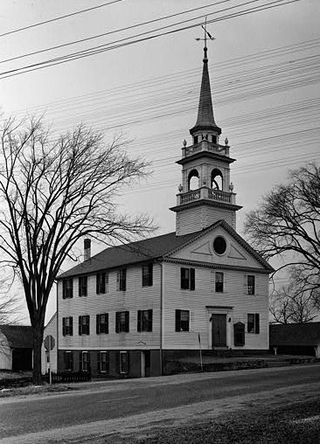
Preston City is a village and the original town center of the town of Preston, Connecticut, United States. The core of the village around the junction of Old Northwest Road and Route 164 is designated as the Preston City Historic District, a historic district that is listed on the National Register of Historic Places. The district is located along Old Shetucket and Amos Roads, which, prior to the 1930s, were major thoroughfares.
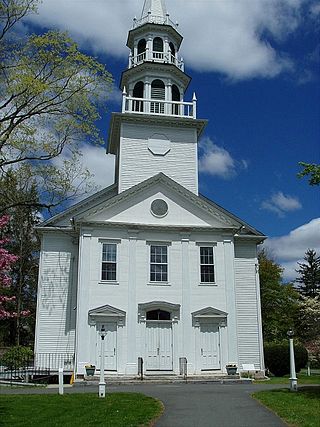
The South Britain Historic District encompasses the core of the unincorporated village of South Britain in Southbury, Connecticut, United States. The village arose in the 18th century as an industrial center serving the surrounding agricultural community, powered by the Pomperaug River, and rivalled the town center of Southbury in importance. The district was listed on the National Register of Historic Places in 1987.

The Georgetown Historic District is a historic district which covers the central portion the village of Georgetown, Connecticut. The district includes parts of Georgetown in the towns of Redding, Weston, Wilton, and Ridgefield and consists of the former Gilbert & Bennett manufacturing plant, institutional housing built for the plant workers, other private homes, and the Georgetown business district.
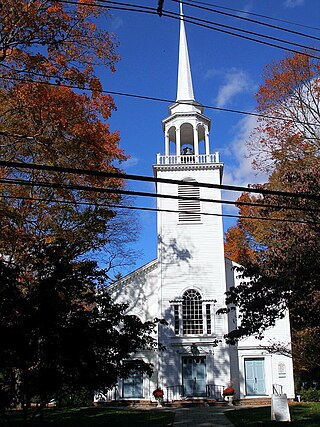
The Greenfield Hill Historic District encompasses the historic village area of the village of Greenfield Hill in northern Fairfield, Connecticut. The area was important from the mid-18th to 19th centuries as an intellectual center in the town, driven in part by Timothy Dwight, the Greenfield Hill Church minister and later president of Yale College. The district features a variety of architectural styles from the 18th to mid-19th century. It was listed on the U.S. National Register of Historic Places in 1971.

The Ridgefield Center Historic District is part of the town of Ridgefield, Connecticut. It was listed on the National Register of Historic Places in 1984.
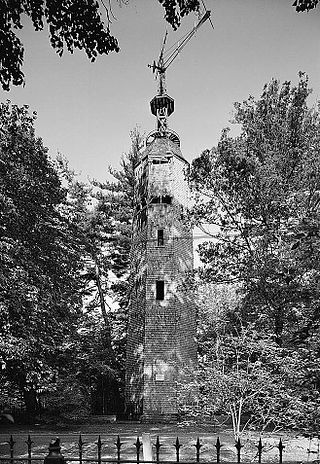
The Bronson Windmill is an historic windmill at 3015 Bronson Road in Fairfield, Connecticut. Built in 1893-94, it is the only surviving windmill in the town, ouf a number that once dotted the landscape. It was built for Frederic Bronson, owner of the local estate. The mill was listed on the National Register of Historic Places in 1971.

Goshen Historic District is a historic district encompassing the town center village of Goshen, Connecticut. Centered at the junction of Connecticut Routes 4 and 63, the village developed historically as a rural crossroads of two turnpikes, and has retained its rural character. It is dominated by residential architecture from the first half of the 19th century, and includes churches, a store, and the town's former 1895 town hall. It was listed on the National Register of Historic Places in 1982.

Norwichtown is a historic neighborhood in the city of Norwich, Connecticut, United States. It is generally the area immediately north of the Yantic River between I-395 and Route 169.
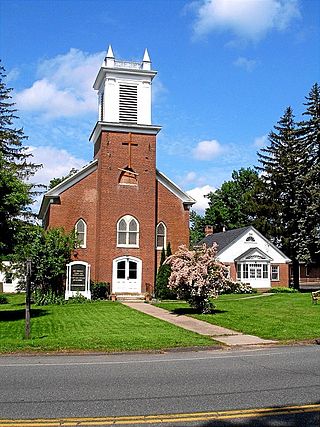
The Bethlehem Green Historic District is a historic district in the center of the town of Bethlehem, Connecticut, listed on the National Register of Historic Places in 1982 for the architectural significance of the houses around the town green. The historic district includes the green and 63 contributing properties over an area of 55 acres (22 ha).

The South Canaan Congregational Church is a historic Congregational church building at Connecticut Route 63 and Barnes Road in the town of Canaan, Connecticut. Built in 1804, it is a remarkably, well-preserved example of early Federal period church architecture. It was listed on the National Register of Historic Places in 1983.

The Woodbridge Green Historic District is a historic district encompassing the historic town center of Woodbridge, Connecticut. It is located in the block bounded on the south by Center Road, on the east by Newton Road, and on the north and west by Meetinghouse Lane. The center is a good example of early 20th-century town planning, with good examples of Colonial and Classical Revival architecture. The district was added to the National Register of Historic Places in 2003.
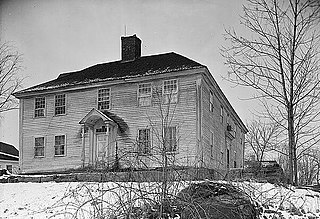
The North Stonington Village Historic District is a 105-acre (42 ha) historic district encompassing the historic center of the main village of North Stonington, Connecticut. The district includes a well-preserved small industrial village, which flourished in the years before the American Civil War, and declined afterward. The district was listed on the National Register of Historic Places in 1983.
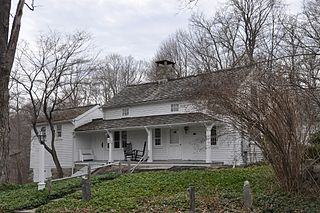
The Benedict House and Shop is a historic property at 57 Rockwell Road in Ridgefield, Connecticut. Built in 1740, the connected house and shop are among the oldest surviving buildings in the community. The shop is a particularly rare example of a cobbler's workshop of the 19th century. They are further notable for the sympathetic restoration they underwent at the hands of architect Cass Gilbert. The property was added to the National Register of Historic Places on December 4, 1998.

The Thomas Hyatt House, also known as the Cashman House, is a Colonial style house at 11 Barlow Mountain Road in Ridgefield, Connecticut. Built about 1735, it is one of the community's oldest and best-preserved houses, retaining much of its original layout and features. It was listed on the National Register of Historic Places in 1984.

The First Congregational Church of Litchfield is a congregation of the United Church of Christ in Litchfield, Connecticut, USA, occupying a historic building on the Litchfield green.

The Watertown Center Historic District encompasses the historic village center of Watertown, Connecticut. It exhibits architectural and historic changes from the early 1700s into the 20th century. It is roughly bounded by Main, Warren, North, Woodbury, Woodruff, and Academy Hill Roads, and was listed on the National Register of Historic Places in 2001.





















